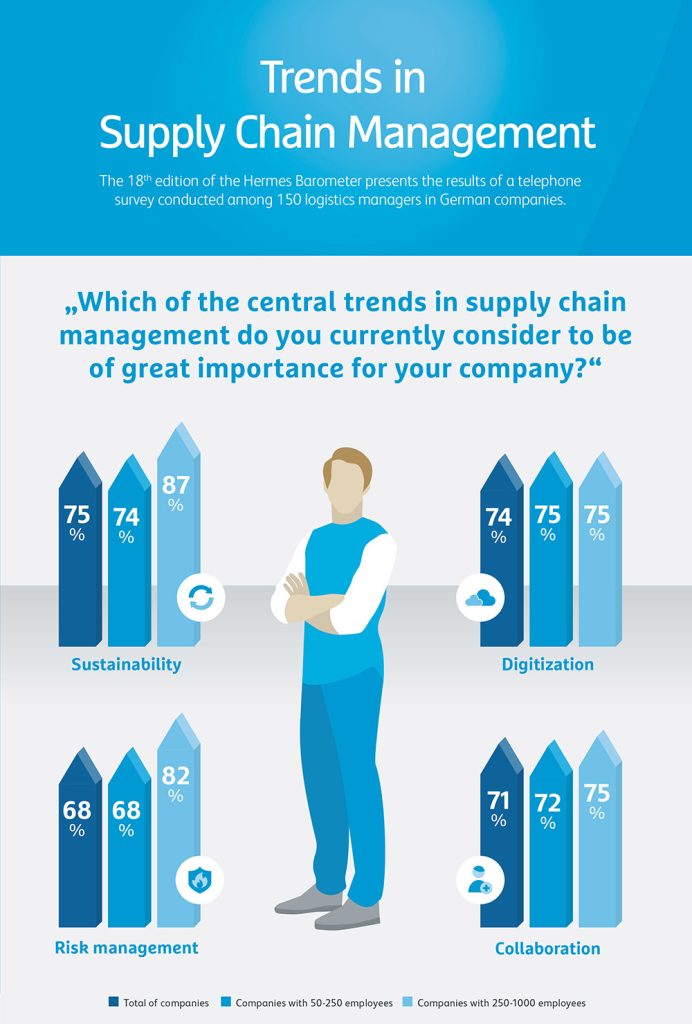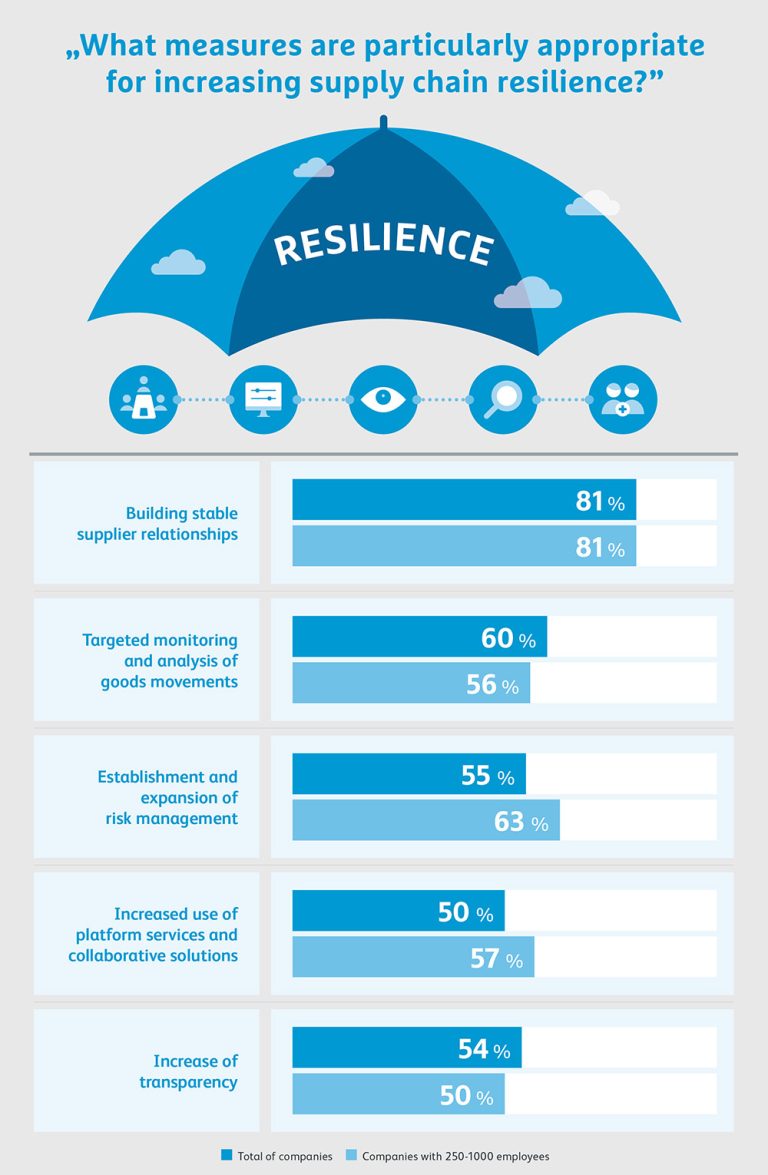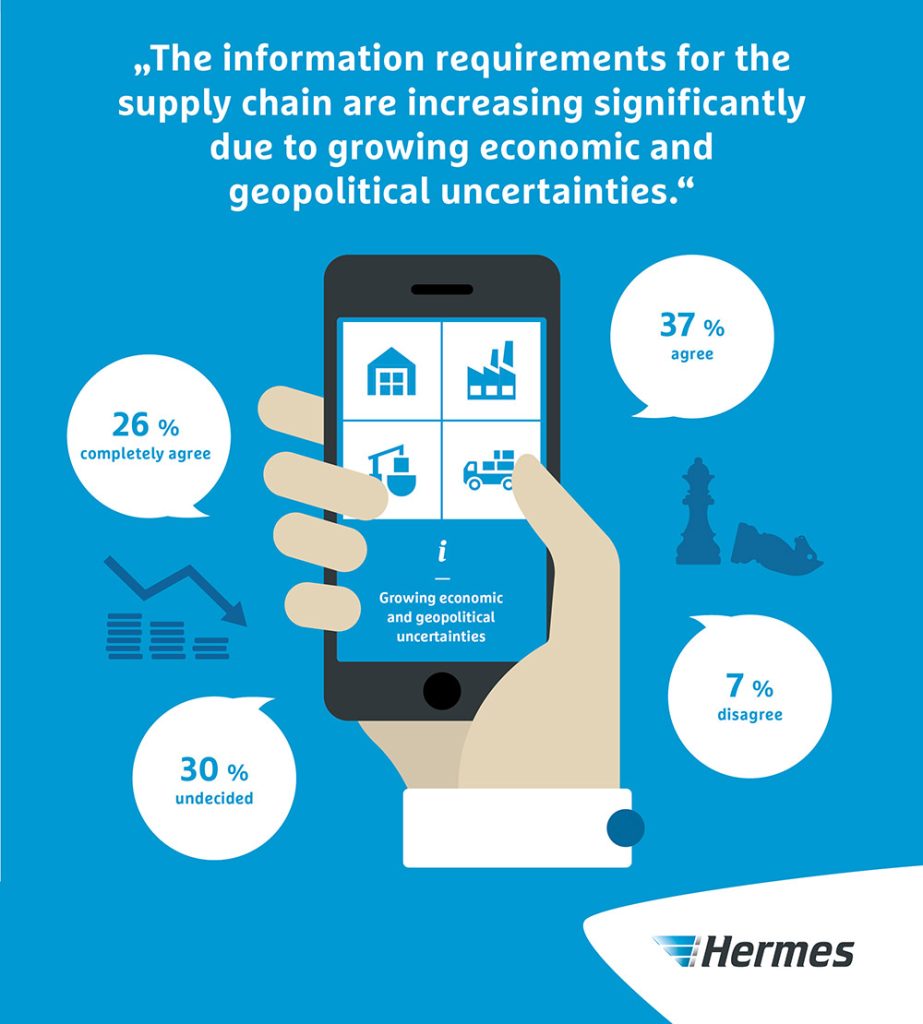Ecological responsibility and the use of digital technologies are currently among the key trends in supply chain management. According to the 18th Hermes Barometer “Trends in Supply Chain Management “*, this view is held by around two-thirds of a total of 150 logistics managers from German companies surveyed. For greater supply chain resilience, the respondents also rely on stable supplier relationships and the establishment of an efficient risk management. The basis for the latter is a detailed and transparent data overview – however, companies still see potential for optimization in this context.
The majority of companies surveyed for the 18th Hermes Barometer currently view the topics of sustainability and digitalization as key trends in supply chain management. At 78 percent, most participants agree that digital technologies have a significant influence on the resilience of the supply chain and make a decisive contribution to being able to successfully overcome future crises. In medium-sized companies with 50 to 250 employees, as many as 83 percent share this assessment.
For three quarters of respondents, it is extremely important that companies assume ecological responsibility. This assessment grows with company size: for companies with 250 to 1,000 employees, almost nine out of ten respondents (87 percent) confirm that compliance with the German Supply Chain Act and other legal guidelines, as well as reducing CO2 emissions in the supply chain, are currently a strong focus topic. “Sustainability is one of the top issues of our time. The successful reduction of the CO2 footprint and corresponding climate protection measures require strategic rethinking and the modification of previous work processes,” Moritz Gborglah, Division Manager and digital transformation expert at Hermes International, a division of Hermes Germany, comments on the survey results.
Collaboration and risk management to strengthen the supply chain
The respondents rated collaborative cooperation along the supply chain as a further trend in supply chain management. In companies with 250 to 1,000 employees, 75 percent of logistics managers have already recognized the potential of cross-company networking.
“Companies are increasingly aware of the positive impact of collaborative working and are therefore consciously focusing on cooperation with partners and suppliers”


And yet – the more complex and global supply chains become, the more diverse the risks they are exposed to. Efficient risk management for the identification, elimination and prevention of disruptions in the supply chain is therefore seen as the second strongest trend in supply chain management by 82 percent of larger companies with 250 to 1,000 employees.
Establishing stable supplier relationships is important for companies
In order to increase the resilience of the supply chain in the long term, the survey participants see the establishment of stable supplier relationships as a particularly suitable measure: Eight out of ten of the survey respondents (81 percent) across all company sizes consider collaborative partnerships within the supply chain to be very important.
“Companies are increasingly aware of the positive impact of collaborative working and are therefore consciously focusing on cooperation with partners and suppliers,” confirms Moritz Gborglah. “In this way, they can proactively counteract potential risks and increase the efficiency of procurement processes.”
Importance of transparency and platform solutions not yet sufficiently recognized
Risk management, sustainability control and partnership-based collaboration benefit from detailed insights and analyses of process data across the entire supply chain – after all, a detailed data overview is the basis for sound decisions and optimized work processes. However, companies have so far been rather hesitant in their approach to this topic: Only every other respondent (54 percent) sees transparency as a significant tool for strengthening the supply chain.
The 18th Hermes Barometer also reveals further potential for development in the increased use of platform solutions: Collaboration is indeed seen as a central trend in supply chain management. However, only half of all participants surveyed consider the use of collaborative solutions to be a suitable measure for increasing supply chain resilience.
“Through digital networking, companies are able to merge real-time information, better manage resources and optimize processes”
Digitization as a strategic orientation of companies
Digitized data and information management along the supply chain is the basis for sound decision-making and risk prevention. Companies are therefore well advised to continue to focus their strategic orientation on the optimization potential of data transparency and data analysis.
“Especially for collaborative partnerships, the constant and transparent exchange of data within the supply chain pays off. Through digital networking, companies are able to merge real-time information, better manage resources and optimize processes,” says Moritz Gborglah. “For successful implementation in practice, Hermes helps companies take a holistic view of their supply chain and gain valuable insights from the information they collect.”
The complete 18th Hermes Barometer is available for download here free of charge. For more information on supply chain optimization and logistics, visit the Hermes Supply Chain Blog at: www.hermes-supply-chain-blog.com.


